Film Name: 回西藏 / Kong and Jigme
Last night I went to the cinema to see my first good film since the start of the year, Kong and Jigme, and while I only felt warm and down-to-earth when I first watched it, the more I thought about it afterwards, the better I felt.
Because it was not until I saw the end credits that I realised that the protagonist Kong was based on Kong Fan Sen, and that the friendship between him and the other protagonist Jigme was real – in other words, it was firstly a feature film focusing on life, work and friendship, and then an ode to the spirit and noble character of the Tibetan cadres. In other words, it showed me firstly a feature film focusing on life, work and friendship, and secondly an ode to the spirit and noble character of Tibetan cadres.
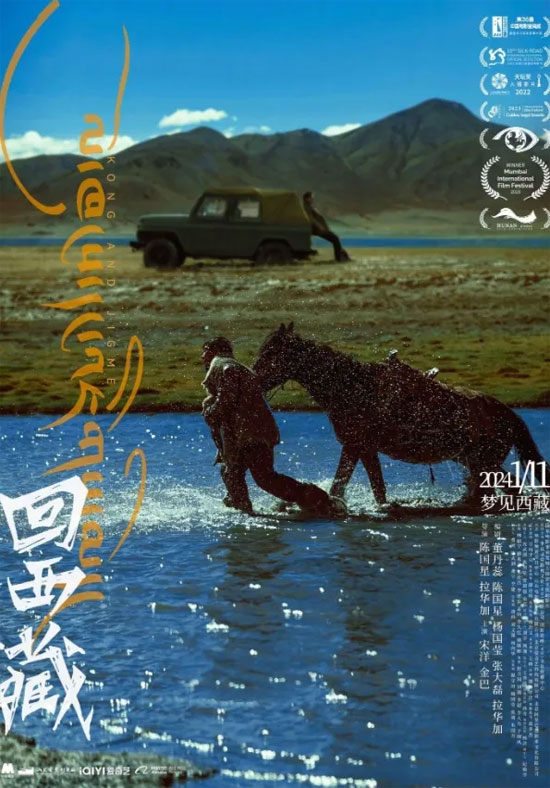
Kong and Jigme is not like the usual empty and dry hymns and tearful texts, it puts more emphasis on the dream and friendship of seeing the big in the small, letting everyone see how a poverty alleviation cadre who came to the border of the motherland from thousands of miles away tries to make things work, and the relationship between Lao Kong and Jigme is the blossoming of this spirit after taking root, and it doesn’t take away from the greatness of the film no matter how you interpret it.
It’s amazing to see a film that meets the aesthetics of the current era, ‘Kong Fan Sen’ and ‘Jiao Yulu,’ which is rare and must be praised.
[Friendly reminder: there will be spoilers below]
Since the deepest impression I got from Kong and Jigme was about the positive values it expresses, I will focus on this part below, without exploring much of the Tibetan culture and other elements shown in the film.
First of all, I would like to make a complaint: why is it that many of our reporting documents and melodramatic literary works over the years have often appeared to be fake, empty and detached from the masses? Not only because their creative thinking is still stuck in the past, but also because decades and generations down, the mainstream social thinking has slowly changed.
In the past to promote those advanced deeds, it is always customary to highlight the suffering and selflessness of the heroes, and then add a few slogans, most people can accept, because at that time we basically believe in this, in addition to the general poverty of the people at that time, and not to emphasise a little bit of the spirit of sacrifice, it is really not easy to smooth out the logic.
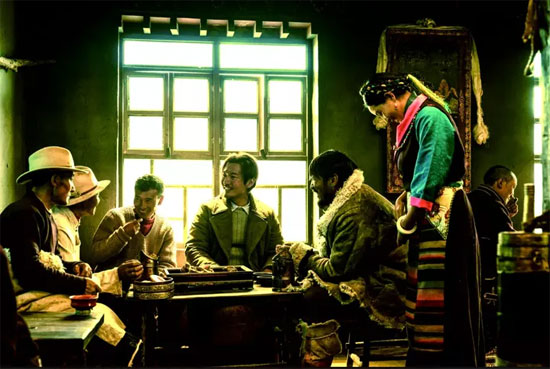
But now the reform and opening up and the market economy has been several decades, and then over-emphasis on the spirit of sacrifice is no longer enough to convince the public, there must be up-to-date language, techniques, values and sense of access to …… To put it mildly, even if you make the same kind of plate Jiao Yulu and Kong Fansen again, now the audience won’t buy it. The audience won’t buy it.
This is the main reason why I want to praise Kong and Jigme. The film is about the work and life experience of Lao Kong, a Tibetan cadre, who came to the border counties in 1979, and the story is still the same, but it is able to make people look into it.
The film is not without suffering, just in the opening scene, Lao Kong almost died in the field because of getting off the wrong bus, and he also suffered from lack of oxygen, vomiting, and other water and soil; not without selflessness, Lao Kong found that he didn’t have enough money to buy seeds for the townspeople, so he used his own money to pay for the seeds……. But all these details have been dealt with in a simple manner, the film puts more space on how Lao Kong learns to integrate into the new townships and how he is able to work with the people. The film devotes more space to how Lao Kong learns to integrate into his new environment and how he encounters problems and solves them.
For example, Lao Kong learned the Tibetan language, learned to ride a horse and eat with a small blade of meat, when Jiumei caught the thief, he felt that there is no evidence of stolen goods, can not cure each other, but Jiumei pulled the other side to the front of the temple to make people swear – even if it is a thief, but also dare not disobey the gods and beliefs, which is the Lao Kong lack of experience and common sense.
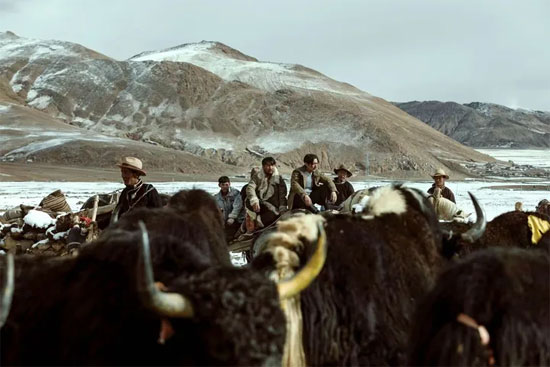
Old Kong does not have that kind of saviour’s superiority, he puts himself on the same position as ordinary Tibetans, treating the Tibetan area as his second home, learning from each other and integrating constantly, which is the premise on which the whole story can stand.
Therefore, Lao Kong is destined to like the cold-faced, warm-hearted and thoughtful Gyume, not only because he can act as an interpreter, but also because he is a local who has gone to school, is cultured and familiar with the customs: Gyume, while helping to deliver the words, is also able to understand his own intentions and find ways to make things happen.
For example, when there was a plague in the flock and both dead and sick sheep had to be disposed of or the flock would die out, Lao Kong reasoned hard and promised government subsidies, but the villagers wouldn’t listen, insisting that it went against common sense and natural law, and it was only when Gyumi convinced the village’s highly respected grandmother, Qu Zhen, that the problem was finally solved.
It’s no wonder that when Rob, the county’s real interpreter, comes back to replace Kumi, Lao Kong is sullen – when Lao Kong proposes to build a dam for the drought-stricken townspeople, some of the older, conservative seniors are opposed to the idea, and besides, the support of the city’s Water Conservancy Bureau isn’t easy to come by, so Rob straight away translates while advising Lao Kong not to toss the idea around, and similarly, the governor of the county After hearing Lao Kong’s idea, he also felt bad about it, and advised Lao Kong not to think too much about one thing at a time.
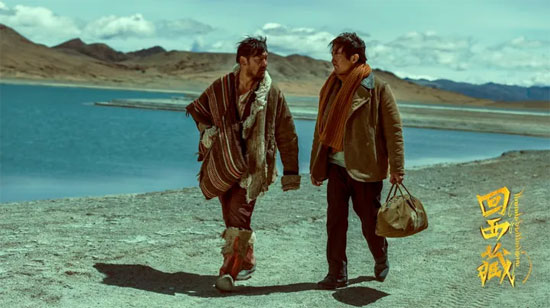
Know how to know the difficulties of Rob and the governor is not wrong, they do their part, repair dams such as the need for up and down the synergistic cooperation of the big project, would not have been a few people pat on the head can easily decide …… However, just rely on the due diligence and the part, it is not to do the results, only the kind of dare to rise to the challenge and believe that the matter of the Only the kind of cadres who dare to face up to difficulties and believe that things are in the hands of the people, it is possible to build a career on the most difficult battlefield.
Lao Kong was not intimidated by the difficulties, he noticed that a part of the village young people and enlightened townspeople are agreed to build a dam, which shows that the work of fighting for public support can be done, as for the lack of support from the higher authorities, then personally take the car to go to the city to run a trip to beg the leaders to do things, ask the leaders to eat meat and drink wine, so that the leaders believe that you can go to the ‘ideal conditions’ place to try the survey ‘The conditions are not ideal,’ the place to try to survey.
In the end, Lao Kong solved the downstream and upstream obstacles, the seemingly impossible things into possible.
Rob, who works on time and is used to travelling by car, is of course a qualified interpreter, but compared to Jiume, who is good at riding horses in the countryside, willing to accompany Lao Kong on his ‘unruly’ trips, and breaks the deadlock by offering meat and wine to the leader, Lao Kong is definitely more willing to let the latter act as his assistant.
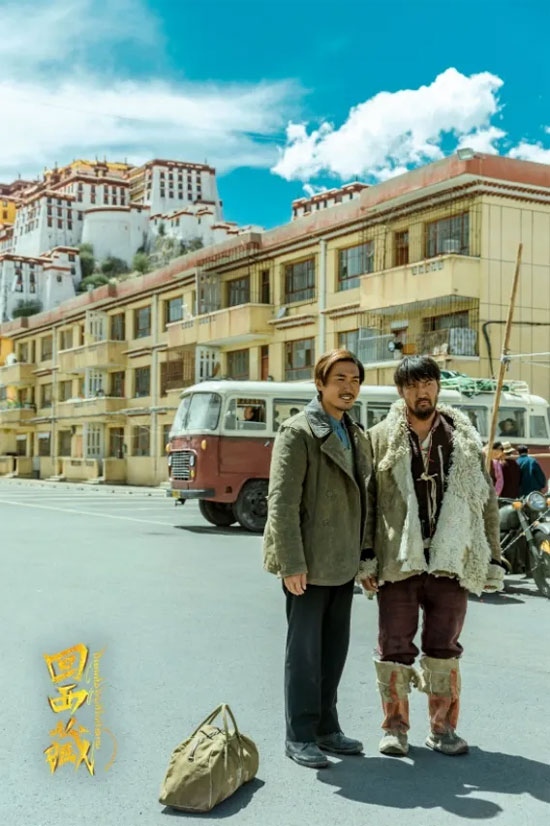
Of course, Lao Kong’s dependence on Jiumei is not purely utilitarian, Jiumei saved his life, he has the heart of repayment, and with the growing contact time, Lao Kong even has a sense of closeness to Jiumei from the heart.
Here we have to mention the identity of Kumi, he was originally from a very good family, went to Chengdu for school, speaks Mandarin and English, but because of the ‘problem of origin’, lost everything in the special period, but also became the object of many people’s dislike, and he is also therefore living in isolation, seldom interact with people – – because of the subjective and objective factors, Lao Kong’s life is very different from his own. Because of the subjective and objective needs of Kung, Kumi’s long-sealed heart was opened.
Lao Kong never stopped learning, and Gyume was the most profound and worthwhile person he met after he came to Tibet. The two of them have always been equal and in agreement in terms of their personalities, thoughts, and interests, which has injected more nutrients into their friendship.
I see a lot of people say, Lao Kong and Kumi exist between the same sex love, this depends on the audience’s own understanding and vision, I think it is a kind of open-ended performance, the second half of the film does add a lot of drama to the two of them, for example, Lao Kong sent Kumi sunglasses, pulling him together for a photo and so on …… But I still think it belongs to precious friendship! I think it’s an open-ended performance.
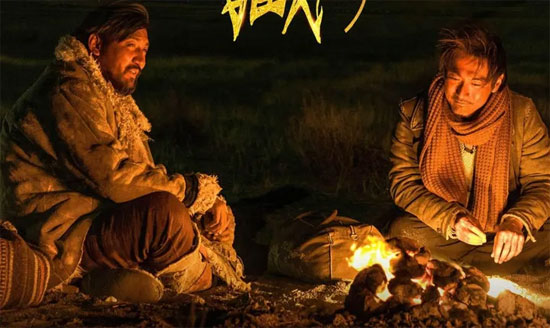
Let’s say Lao Kong teaches Kumi to play the scene of beating the heart of the hand, the game is a test of reflexes and ‘resourcefulness’, the blunt nature of Kumi will certainly suffer, but Lao Kong is obviously not to win the game, but through this ‘tone’ of the communication method of the larger differences, to But Kong obviously didn’t play for the sake of winning.
When Kumi’s song ‘Danny Boy’ was sung under the starry sky on the Tibetan Plateau, any doubts, concerns and barriers between the vast expanse of heaven and earth were all pale and superfluous.
In this distant second homeland, Lao Kong’s personal dream of helping the weak and the poor and the family mission of supporting Tibet and the border is highly unified, that is, he realised the noble self-worth, but also harvested enough to remember the friendship of a lifetime.
It is hoped that all creators of literature and art can see that heroic songs that meet the aesthetics of the new era should be written in this way.
Please specify:Anime Phone Cases » Kong and Jigme 2022 Film Review: This is how an ode to a new era should be written